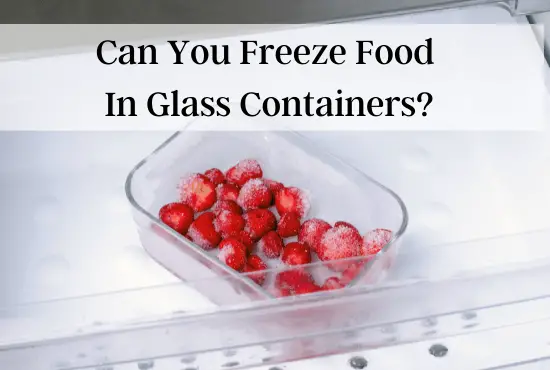Freezing your food in glass-based containers might sound scary to you. What if they burst inside the freezer? Or lead to a similar disastrous situation? These questions might make you doubtful and concerned.
We are here today to uncover this myth for you. So, can you freeze food in glass containers?
You can freeze different types of food safely in glass containers. Always leave an inch or two-room for expansion as food contains water content. Never fill them up completely to prevent cracking. Avoid pouring steamy hot broths and soups directly into the glass container and cool them down beforehand. Use freezer-safe glass jars/containers for long-lasting results.
Just like other storage techniques, glass containers need some precautions that you might fulfill for securing your favorite food. Let’s have a look at them!
Table of Contents
Freezing Food In Glass Containers: Pros And Cons
Most people prefer storing their food in Ziploc or freezer-safe bags. They feel more reliable and budget-friendly. But, contrary to popular belief, glass containers are a safer way to store food in the freezer or fridge.
Plastic storage bags contain harmful chemicals that might mix up with your food. Besides, they are not recyclable and are damaging to the environment. Glass containers, on the other hand, can be recycled and secrete no chemicals into your food. Thus, glass is healthier for you and your family.
Also, they are an efficient way to store your liquid food like soups, sauces, smoothies, etc. They will remain intact without the worry of getting splashed all over inside the freezer.
You might think glass containers will be out of your budget but, it is the other way around. Once you get high-quality glass jars/containers, they can last you for a long time. They are sturdy, don’t break easily, and look brand new after a thorough wash.
However, glass containers require more cautious handling while placing them in the freezer. A Glass tends to break upon liquid expansion and, you should be extra careful when your freeze your food in them.
How To Freeze Food In Glass Containers? The Safest Way
If you have finally planned to go ahead with freezing food in glass containers, you are already on the right track. Some additional guidelines will help minimize the damage to the food and glassware.
To safely freeze food in glass jars/containers, follow the steps listed below.
- Firstly, set the freezer to the right temperature. The ideal range is around 0-5 degrees F. It will help the food stay fresh for an extended period.
- Cool the food down before placing it in glass containers. Warm food is at a higher risk of getting freezer burns.
- Warm food can also increase the temperature of the glass. If you place it directly in the freezer, the rapid temperature change might result in glass cracking.
- Do not overfill the jar/container and leave an inch or two headspaces for content expansion.
- Now, shift it to the coldest corner of the freezer, where it gets exposed to a consistent temperature.
- Lastly, label the glass with the date of freezing it, and pop them inside the freezer till the designated time.
What Type Of Food Can You Freeze In Glass?
There are many food varieties that you can store in glass containers/jars.
1. Fruits and vegetables
Ensure to lay down your fruits/vegetables on a tray and spread them out evenly. Flash-freeze them until they are frozen solid. Afterwards, transfer them into a glass container and place them inside the freezer as long as you like.
2. Soups and sauces
When freezing liquid like soups and sauces, allow a 3cm gap from the top. It doesn’t matter if the consistency of the liquid is thicker, as it is crucial to leave room for expansion.
3. Broths
If you are freezing broth, make sure to follow the gap-leaving step. It will prevent the glass from breaking.
4. Beans
If you have cooked dried beans, first cool them down. Then, transfer them to the glass container. You have to apply the same step in case your beans contain liquid.
5. Baby food
Glass containers work well for baby food as they must be clean from every sort of health risk. Thus, glass is a safer and cleaner option to provide healthy meals every day.
6. Leftover food
Before storing the leftover food, divide them into individual meal-size portions. It makes the thawing and freezing process much simple.
How Long Can Food Remain Frozen In Glass?
If you freeze your food in glass containers, it can last for an extended period. However, there are a few points that you should take into consideration.
Freezer-friendly glass containers/jars stay intact inside the freezer for more time than the ordinary ones. Their design enables them to withstand the harsh environment of the freezer. If you use high-quality glass, it can remain frozen for more than five months.
Secondly, for a longer shelf-life, glass containers need cautious handling. If you store the food keeping all the safety tips in mind, you can get lasting results.
Glass containers do not absorb flavors and smell. Thus, your food will remain flavorful and tasty for months, without its quality getting much affected.
How Can You Defrost Food In Glass Containers?
When it comes to defrosting food in glass containers, you might be a bit reluctant to perform it to avoid breaking. However, you can do it easily without damaging the container and the content inside.
One of the most preferred ways is to place the glass in the fridge for thawing. When you shift it to a refrigerator, the container defrosts slowly and results in an even thawing.
You can also place the glass jar/container on the countertop for defrosting. But, it might result in air contamination and cause food-borne illness. It also makes the content not fit enough to undergo refreezing. Thus, it is not a recommended method.
Never put glass containers in the microwave when they are fully frozen. As it heats, the heated portion of the glass expands slightly and can shatter. So, if you are in a hurry, place the container in a basin of cool water and do not opt for the microwave option.
Conclusion
To sum up, using glass containers for freezing and storing food has many benefits. It is an environment-friendly option and also keeps your food nice and healthy.
To avoid unnecessary damage to your glass containers, follow the detailed tips and tricks highlighted in this article. It will not only make your freezing process easy but save you from food wastage.
They are ideal for liquid-based food items that are otherwise difficult to store. You can also place solid food inside them but avoid overstuffing at every cost.
Glass containers might require a little extra effort but, the results are worth all the hard work. Instead of plastic bags/containers, glass is a much more efficient and healthier alternative.


